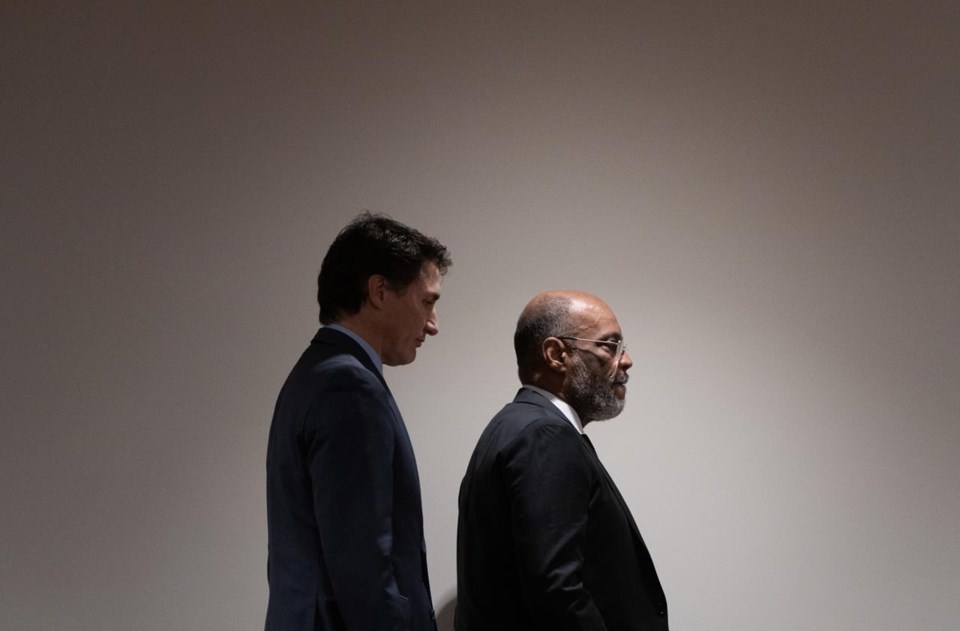NEW YORK — Prime Minister Justin Trudeau would not say Thursday whether Canada will take part in a Kenya-led multinational security mission in Haiti that the United Nations is under mounting U.S. pressure to authorize.Â
The question of how best to help dominated Trudeau's final day at the UN General Assembly, where President Joe Biden pleaded Tuesday for urgent help for the violence and poverty-racked Caribbean nation.Â
Media reports suggest a request for approval for a security mission could arrive at the UN Security Council as early as next week, but Trudeau assiduously avoided any hint that Canada would play a role.
"Let's be very clear that Canada is one of the countries — if not the country — that has been leaning in most substantively and standing up for the Haitian people," he told a news conference.Â
That includes an additional $80 million for the Haitian police on top of $100 million announced back in March, as well as sanctions against three more members of the country's corruption-riven business community, bringing the total to date to 29.
"Canada is taking action in significant ways, but Canada also has 30 years of experience in supporting the Haitian people," Trudeau said.Â
"The only lasting solutions will come through working with the Haitian people themselves, empowering the Haitian people themselves to direct and take responsibility for the future."Â
It's largely the same message he used to push back against months of overt and at times public pressure from the U.S. that not only should Canada take part in such a mission, it should be the one to lead it.Â
That vacuum has since been filled by Kenya and its offer to send 1,000 police officers to help train their Haitian counterparts, who are badly outnumbered and under-resourced in a country of 11 million people.Â
"There is no solution to this situation from outside," Trudeau said earlier in the day as he sat down for a bilateral meeting with acting prime minister Ariel Henry. Â
"We have a role to play from outside … but we need to see more dialogue, more consensus-building within Haiti and around the Haitian people."
He also spoke briefly during an ad-hoc advisory group organized by Canada that included Henry and presided over by Bob Rae, Canada's ambassador to the UN and unofficial point man on the Haiti file.
Violent gangs have run rampant since the 2021 assassination of president Jovenel Moïse, blockading fuel deliveries and terrorizing locals, all in the midst of a cholera outbreak.
Little progress has been made on the ground since then, but Rae said Thursday that he's confident that diplomatic and political efforts to muster support for the country are beginning to bear fruit.Â
"It's been very difficult in terms of getting agreement and making progress, but we are getting somewhere," he said.Â
That includes an emerging consensus that security, humanitarian aid, sustainable development and political and legal accountability must all be components of any effective solution.Â
And the Canadian perspective — that outside interventions are likely to have little to no lasting impact without the Haitians themselves playing a leading role — seems to be winning the day, Rae said.Â
"I think those views, which we've had for a long time, are now becoming more broadly accepted," he said. "So whatever emerges from the Security Council we hope will be part of that implementation."Â
Leaders from the coalition of Caribbean nations known as Caricom will attend a summit in Ottawa next month, where the discussions are likely to focus on how best to reinforcing security for neighbouring countries as well.
"What's happening in Haiti is obviously terrible for the people of Haiti. It's devastating what's taking place, but it's also very dangerous for the security of the whole region," Rae said.Â
"That's been an approach, again, that we've been pressing for and moving forward on, and I'm quite optimistic that we're going to see a little bit more light and agreement in the next few weeks."
During the summer, Canada announced plans to co-ordinate a multilateral effort that would help make the Haitian police a more effective security force.Â
Those efforts included a "co-ordination cell" to assess their most pressing needs, such as training and equipment, and to figure out how supporting countries could best meet those requests.
This report by The Canadian Press was first published Sept. 21, 2023.Â
James McCarten, The Canadian Press




